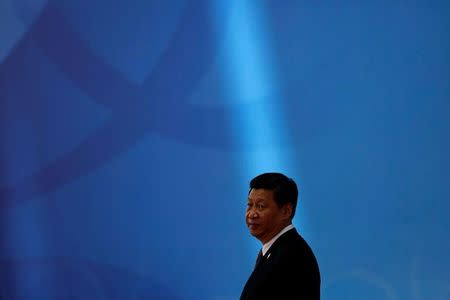Timeline: Under Xi, five years of tighter controls across Chinese society

BEIJING (Reuters) - From Internet regulation and online censorship to a clampdown on activists and non-governmental organisations, China has tightened controls on Chinese society since Xi Jinping assumed power in late 2012, first as Communist Party chief and then as president in 2013. Xi is ready for a second five-year term as the nation's leader and is expected to consolidate his power at next week's Communist Party Congress. Below are some of the key milestones in the past five years: - Dec. 28, 2012 China approves rules requiring internet users to register with their real names when signing up to network providers and legalises the removal of what the government considers illegal online content. - Sept. 1, 2013 A law comes into effect requiring all mainland smartphones and landline services to be registered using a nationally-issued ID or passport. - Sept. 9, 2013 China's top court and prosecutor unveil measures to stop the spread of what the government calls irresponsible rumours. Those creating untrue posts that spread may face three years in jail. - Jan. 24, 2014 Xi is appointed head of China's new National Security Commission, a body charged with bolstering defences against threats at home and abroad. The commission has played a key role in getting a raft of new laws passed during Xi's first term. - Sept. 23, 2014 China jails for life Uighur rights activist Ilham Tohti on charges of separatism in its western Xinjiang region. The economics professor had criticised the government for not giving Xinjiang and its largely Muslim ethnic Uighurs more autonomy. - Nov. 1, 2014 China passes counter-espionage law aimed at tightening state security and helping build a comprehensive national security system. The law allows authorities to seal or seize any property linked to activities deemed harmful to the country. - July 1, 2015 China's legislature adopts a national security law that covers everything from territorial sovereignty to tighter cyber security. The law makes all key network infrastructure and information systems "secure and controllable". - July 9, 2015 China launches what rights groups say is a coordinated attempt to quash China's rights movement, in what is known as the "709" crackdown, with hundreds of rights lawyers detained. Dozens were later formally arrested and some were jailed. - Dec. 14, 2015 Chinese authorities block diplomats, foreign reporters and protesters from the trial of rights lawyer Pu Zhiqiang, charged with inciting ethnic hatred and provoking trouble. Pu was disbarred and got a three-year suspended sentence. - Dec. 27, 2015 China passes counter-terrorism law requiring technology firms to help decrypt information, and allows the military to venture overseas on counter-terror operations. - Feb. 19, 2016 Xi asks for total loyalty to the Party during a high-profile tour of China's main state media, the Xinhua News Agency, broadcaster CCTV, and the People's Daily. He said state media must "speak for the Party's will and its propositions and protect the Party's authority and unity." - Apr. 28, 2016 China's parliament passes law governing foreign NGOs. The law, which took effect on Jan. 1, 2017, grants broad powers to police to question NGO workers, monitor their finances, regulate their work and shut down offices. - Nov. 7, 2016 China adopts cyber security law to counter what Beijing says are growing threats such as hacking and terrorism. It requires local and overseas firms to submit to security checks and store user data in China. The legislation took effect in June 2017. - Jan. 23, 2017 The government launches campaign to rid Chinese cyberspace of VPNs and other network tools used to evade censorship. The rules task telecoms providers with identifying and removing illicit network tools and reporting the names of individuals tracked. The measures must be fully in place by March 2018. - March 10, 2017 Xi calls for a "great wall of iron" to safeguard security in Xinjiang, which officials say is China's frontline in the battle against terrorism. Critics argue that Xi's crackdown has turned it into a security state, where new restrictions target religious and ethnic expression. - June 27, 2017 China's legislature passes an intelligence law, granting authorities new powers to monitor suspects, raid premises, seize vehicles and devices and operate overseas. - June 30, 2017 An entertainment industry association circulates new regulations saying that with immediate effect all films and video content posted online will need to be reviewed by at least two "auditors" before being publicly posted, banning content deemed offensive to "core socialist values" including depictions of homosexuality, drug addiction and poverty within China. - July 20, 2017 Telecoms carriers circulate notices saying they will begin closing unauthorised VPNs and other circumvention tools as part of their responsibilities under the directive issued on Jan 23. According to data by local researchers, hundreds of locally-run VPN apps disappear from iOS and Android app stores within weeks. - Sept. 7, 2017 China's internet regulator releases new rules on group messaging apps, making users who administer groups legally liable for content deemed offensive by the party. Under new user terms since released by Tencent, which runs popular chat app WeChat, all user data is made available immediately and without restriction to the authorities. - Sept. 11, 2017 A Chinese court tries Taiwanese pro-democracy activist Li Ming-che, who confesses to attempting to subvert the Beijing government, in the first case of a Taiwanese NGO worker being tried in China since the foreign NGO law came into effect. (Reporting by Ben Blanchard and Cate Cadell; Editing by Tony Munroe and Martin Howell)

